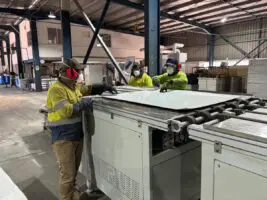Australia has been singled out as one of the least prepared of the world’s advanced economies to make the (inevitable) transition to low-carbon energy, according to a new report from the World Economic Forum, and it’s a lack of progressive policy that is to blame.
The report, which benchmarks countries on the performance of their energy system now, and their readiness for the shift to distributed renewables in the future, ranks Australia 43rd out of 115 on the 2019 Energy Transition Index, just below Croatia, and above Peru.
 But among the list’s advanced economies, Australia ranks almost last in its preparedness to transition to a “secure, sustainable, affordable, and reliable energy future” the WEF says – number 28 out of 32 countries.
But among the list’s advanced economies, Australia ranks almost last in its preparedness to transition to a “secure, sustainable, affordable, and reliable energy future” the WEF says – number 28 out of 32 countries.
And while the average overall Energy Transition Index score for advanced economies sits at 88/100, Australia scores just 59/100. Australia’s score on “transition readiness” is a pitiful 54 per cent.
 Australia, says WEF, is among the only large economies in that group – alongside Canada and South Korea – with scores below the top quartile on the ETI, primarily thanks to low scores on environmental sustainability.
Australia, says WEF, is among the only large economies in that group – alongside Canada and South Korea – with scores below the top quartile on the ETI, primarily thanks to low scores on environmental sustainability.
“Although ranking high on economic growth and energy security, the three economies are among those with the highest carbon intensity of fuel mix, per-capita energy consumption and carbon emissions in the world,” the report says.
This is nothing we didn’t already know, of course. But it is also something our current federal government seems hell bent on ignoring, if not denying outright.
Instead, the Morrison Coalition government remains hell-bent on linking any significant action on reducing Australia’s emissions – and in particular in the energy sector with ambitious renewable energy targets – to the downfall of the economy and Australian life as we know it.
Predictions of the ruination of sausage sizzles aside, the WEF does not deny the energy transition will be complex and tough going at times. Rather, it notes, this is all the more reason for putting in place a sensible and well thought out transition plan, and sticking to it, to ensure a just transition for all.
“Unless policy design addresses the potential negative socio-economic effects of the low-carbon transition, society will continue to face fierce opposition from fossil fuel-dependent communities that could hinder the energy system’s decarbonisation,” the report says.
“Recent resistance from the Australian government to abandoning coal … sheds light on the complexity of developing stable policies.
“(The Australian government has) presented counterarguments to abandoning coal that are linked primarily to the effect on localised economies or communities,” it says.
“Countries lagging in the rankings demonstrate the inertia of legacy systems and the need for a strong enabling environment.”








